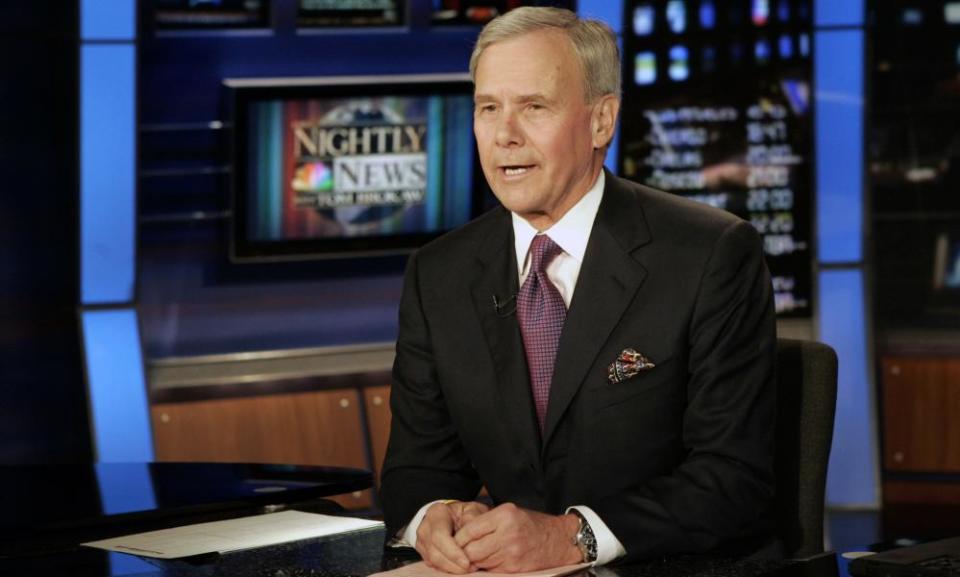Larry King dies, Tom Brokaw retires – and the 'heroic age' of TV news slips further away

As Tennyson – and Withnail’s Uncle Monty – had it, the old order changeth, yielding place to new. Larry King, whose death was announced on Saturday, was not the only giant of US TV news to leave the scene this week.
Related: Larry King, talk-show titan who lit up worlds of politics and showbiz
At NBC, Tom Brokaw retired after a 55-year career. Dan Rather, once a stalwart at CBS, is staying active but change came even to him, with the launch of his own newsletter on Substack.
Each fashioned his career before the age of the internet, Brokaw and Rather presenting network news, King a talk show titan for CNN in its days as a cable upstart.
Brokaw covered the 1968 presidential campaign, the rise of Ronald Reagan and the 9/11 attacks. Rather, the assassination of John F Kennedy and the rise and fall of Richard Nixon. King was the veteran of 50,000 interviews.
Robert Thompson, director of the Bleier Center for Television and Popular Culture at Syracuse University in New York state, said this week merely brought “one more transition” away from an older era.
“The real transition occurred in 2004-2005,” he said, “when the legacy evening news anchors, ABC’s Peter Jennings, Brokaw and Rather stepped away”.
Each in their own way was an inheritor of Walter Cronkite, the giant of CBS who ended each evening broadcast with the phrase: “And that’s the way it is.”
“That seems so quaint today – like a statement that could have be uttered in colonial Williamsburg from ye olden days,” said Thompson, adding that Cronkite, Rather and Brokaw covered the big stories of the late 20th and early 21st centuries “at least with the lingering sense that their reports were the data we could talk about and agree upon a narrative”.
Rather is now 79, Brokaw 80. They have, Thompson said, “outlived that news environment by many years and represented remnants of a TV news culture that was already breaking up into many different cultures of news”.
Earlier, Rather told the Washington Post: “The distance between 2005 and 2020 in terms of how journalism in this country has evolved is pretty staggering. Never mind going back as far as the 1970s when Walter Cronkite … ruled supreme at the anchor desk.”
Recently, Brokaw had been an occasional contributor for NBC. Announcing his formal retirement on Friday, the network noted that he was the only anchor to have led all three of its major news shows: Nightly News, Today and Meet the Press.
King was CNN’s only star for a least two decades. It was only after Fox figured out how to keep people watching 24-hour cable news without any breaking stories, Thompson said, essentially by putting on opinionated star hosts like Bill O’Reilly, that CNN and its competitor MSNBC “limped toward playing the same game and started countering with Chris Cuomo, Don Lemon and that kind of thing”.
Paying tribute to King, CNN founder Ted Turner said: “If anyone asked me what are my greatest career achievements in life, one is the creation of CNN and the other is hiring Larry King.”
Related: Larry King obituary
New York Times television critic James Poniewozik also said this week’s changes were a postscript to bigger shifts many years ago.
“There’s always a tendency to look back to a Periclean age,” he said. “The world has always been going to hell from the point of view of people looking back to whatever the last thing was.
“Anchors of Brokaw and Rather’s era had a level of power consolidated in them and a level of influence because they had these huge aggregate audiences that don’t exist anymore and they were competing with fewer other voices.
“They were in a way like world luminaries in themselves.”

 Yahoo Finance
Yahoo Finance 